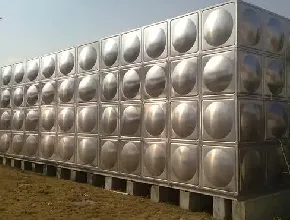loading...
- No. 9, Xingyuan South Street, Dongwaihuan Road, Zaoqiang County, Hengshui, Hebei, China
- admin@zjcomposites.com
- +86 15097380338
- Welcome to visit our website!
frp filter tank
The Importance of FRP Filter Tanks in Modern Filtration Systems
In recent years, the demand for efficient and durable filtration systems has surged, particularly in industries such as water treatment, chemicals, and food production. One of the most innovative solutions that have emerged in this field is the use of Fiberglass Reinforced Plastic (FRP) filter tanks. These tanks are revolutionizing the way we approach filtration, offering numerous advantages over traditional materials. In this article, we will delve into what FRP filter tanks are, their benefits, applications, and why they are becoming a preferred choice in various industries.
What are FRP Filter Tanks?
FRP filter tanks are constructed from a composite material that combines fiberglass and resin. The fiberglass provides significant strength and durability, while the resin acts as a protective layer that prevents corrosion and chemical damage. This combination results in tanks that are not only lightweight but also exceptionally robust.
These tanks are designed to hold various types of filtration media, such as sand, activated carbon, or resin, which work together to remove contaminants from liquids or gases. The design of FRP filter tanks can vary, including vertical and horizontal configurations, depending on the application and available space.
Advantages of FRP Filter Tanks
1. Corrosion Resistance One of the most significant advantages of FRP filter tanks is their resistance to corrosion. Unlike metal tanks, which can rust and degrade over time, FRP tanks are immune to many chemicals, making them ideal for harsh environments. This characteristic extends the lifespan of the tanks and reduces maintenance costs.
2. Lightweight FRP filter tanks are considerably lighter than their metal counterparts. This lightweight nature simplifies transportation and installation, allowing for easier handling and reduced labor costs. This feature is especially beneficial in settings where space and weight constraints are critical.
3. Versatile Applications FRP filter tanks can be tailored for a wide range of applications, making them versatile in their use. They can accommodate different filtration media and are suitable for various industries including water treatment, industrial processes, aquaculture, and even aquariums.
4. Cost-Effectiveness Although the initial purchase price of FRP filter tanks may be higher than that of traditional materials, their durability and reduced maintenance needs lead to lower overall costs in the long run. Businesses can save significant amounts by avoiding frequent replacements and repairs.
frp filter tank

5. Customizability The manufacturing process of FRP allows for extensive customization. Tanks can be designed to specific sizes, shapes, and features to suit the particular needs of any operation. This flexibility is not only advantageous for meeting contemporary requirements but also for accommodating future expansion or change.
Applications of FRP Filter Tanks
FRP filter tanks have found a wide range of applications across various sectors
- Water Treatment In municipal and industrial water treatment plants, FRP tanks are used in various filtration processes, including sedimentation, reverse osmosis, and biological filtration. Their resistance to corrosion and ability to handle various chemicals make them ideal for this application.
- Chemical Processing The chemical industry often deals with aggressive substances that can corrode standard materials. FRP filter tanks ensure safe storage and handling of these chemicals without the risk of contamination or degradation of the tank.
- Food and Beverage In the food and beverage sector, maintaining high hygiene standards is critical. FRP tanks can be easily cleaned and sanitized, making them suitable for applications involving food processing and production.
- Aquaculture FRP tanks are widely used in aquaculture for water filtration systems. Their lightweight and durable properties allow them to sustain aquatic environments while ensuring the health of fish and other marine life.
Conclusion
FRP filter tanks represent a significant advancement in filtration technology, proving to be a durable, lightweight, and versatile solution for a myriad of applications. As industries continue to innovate and evolve, the adoption of FRP filter tanks will most likely increase, driven by their cost-effectiveness and resilience. For businesses seeking reliable filtration solutions, investing in FRP technology could pave the way for improved efficiency and sustainability in their operations.
-
The Rise of FRP Profiles: Strong, Lightweight, and Built to LastNewsJul.14,2025
-
SMC Panel Tanks: A Modern Water Storage Solution for All EnvironmentsNewsJul.14,2025
-
GRP Grating: A Modern Solution for Safe and Durable Access SystemsNewsJul.14,2025
-
Galvanized Steel Water Tanks: Durable, Reliable, and Ready for UseNewsJul.14,2025
-
FRP Mini Mesh Grating: The Safer, Smarter Flooring SolutionNewsJul.14,2025
-
Exploring FRP Vessels: Durable Solutions for Modern Fluid HandlingNewsJul.14,2025
-
GRP Structures: The Future of Lightweight, High-Performance EngineeringNewsJun.20,2025
